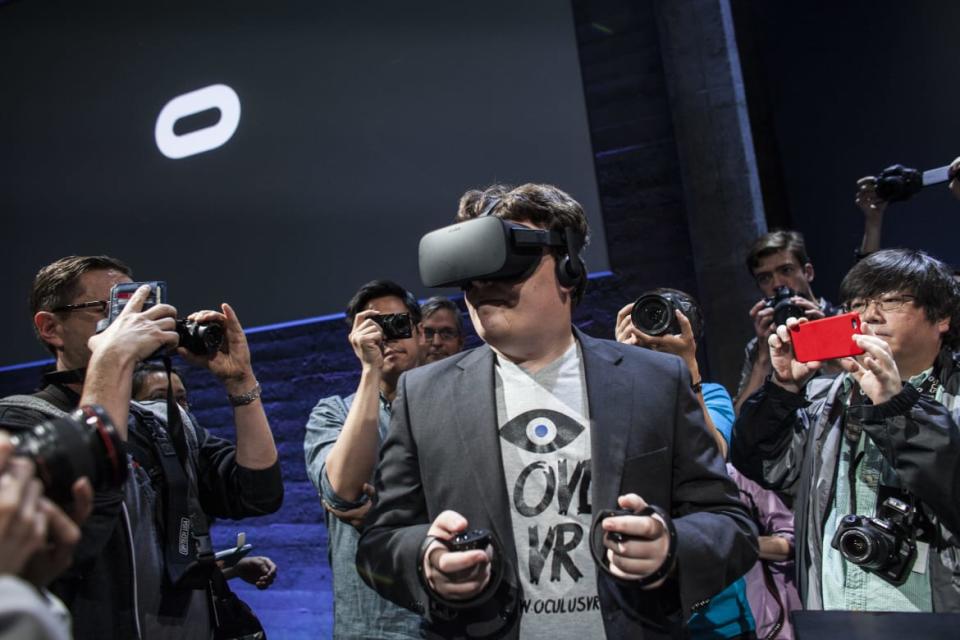Palmer Luckey’s Suicide Headset Is Insane—and a Grim Part of VR’s Future

- Oops!Something went wrong.Please try again later.
Let’s get this out of the way: Palmer Luckey has a history of trolling. In 2016, The Daily Beast reported that the Oculus co-founder donated at least $10,000 to a pro-Trump political organization dedicated to spreading memes maligning Hillary Clinton. The revelation resulted in Luckey’s untimely departure from Facebook, the company that paid him $2 billion for Oculus in 2014. He went on to double down on his hard-right leanings, developing a “virtual border wall” to spy on potential immigrants crossing at the U.S. southern border.
He’s rich. He’s controversial. You get the picture. That’s all important to keep in mind when considering his newest project: a VR headset that kills you if you die in a video game.
Luckey announced the macabre device on November 7 in a blog post titled “If you die in the game, you die in real life.” He wrote that he was inspired by the popular Japanese manga Sword Art Online, which tells the story of a VR massive multiplayer online role playing game that can kill the players if they die in the game or attempt to take off their headset (dubbed NerveGear).

"Palmer Luckey, founder and inventor of Oculus VR, demonstrates the Oculus Rift virtual reality headset and the Oculus Touch hand controllers during an event in San Francisco, California on Wednesday, June 11, 2015.
While the fictionalized version makes use of deadly microwaves to end its wearer’s life, Luckey said he turned to a more rudimentary but no less horrifying method of three explosive charges he usually uses “for a different project” (which he did not elaborate on) attached to the headset essentially like gun barrels. The charges are connected to a photo sensor that detects when the headset’s screen flashes red at a certain frequency during a “game over”display. Once that happens, “the charges fire, instantly destroying the brain of the user.”
As a bit of cold comfort, though, Luckey said that the device “isn’t a perfect system.” For one, he’s only figured out how to kill the user—he hasn’t worked out how to create a fully-realized VR world to use this in yet. The device can also be easily removed, which gets rid of the whole Saw factor that Luckey wants to achieve.
“I have plans for an anti-tamper mechanism that, like the NerveGear, will make it impossible to remove or destroy the headset,” Luckey wrote. “Even so, there are a huge variety of failures that could occur and kill the user at the wrong time.”
(Luckey did not respond when reached for comment.)
Virtual Reality Could Completely Transform Mental Health—if We’re Ready
It’s your run-of-the-mill man-made horrors beyond comprehension—but with a fun VR twist. While it’s easy to brush this off as yet another outlandish stunt from a known provocateur, part of what’s disconcerting about the device is the fact that it is a clear—albeit extreme—indicator of the direction conversations around gaming, VR, and the metaverse at large is going: maximum realism.
The Oculus co-founder himself even said as much in his blog post. “The idea of tying your real life to your virtual avatar has always fascinated me—you instantly raise the stakes to the maximum level and force people to fundamentally rethink how they interact with the virtual world and the players inside it,” he wrote. “Pumped up graphics might make a game look more real, but only the threat of serious consequences can make a game feel real to you and every other person in the game.”
This is about as bleak as you can get when it comes to tech discourse. It also, grimly, hits at something true: the metaverse and gaming technology are rapidly attempting to advance into the realm of the real world by opening up all of our senses to what we see on our screens.
After all, the VR killset concept is simply a horrifying extension of haptic feedback—tech that simulates the sense of touch. You’ve likely experienced it before viavideo game controller rumbles when you shoot a gun in GTA: V or get punched by a giant in God of War. However, engineers and researchers want to build more advanced versions that include everything from VR headsets that create the feeling of spiders crawling on your lip in video games, to underwater drones that let scientists “feel” sunken treasure, or off-Earth rovers that help astronauts grab things on the moon or Mars.
Even Meta (née Facebook) is working on a haptic glove that lets you feel what you touch and grab in the metaverse. Some are even working on full-body haptic systems that allow you to feel sensations all over—opening the doors for some very, very strange and, yes, horny experiences.
Killing its wearer is just the extreme end of making VR technology as close to realism as possible. To Luckey, it’s a way of exploring uncharted territory for video games much in the way that “real-world sports” have done so before.
But is this exploration really saying anything useful—or is it just causing more harm than good for the lulz? Irina Raicu, director of the internet ethics program at the Markkula Center for Applied Ethics, believes that even if it is simply a tongue-in-cheek tech project, it’s a misguided one.
She told The Daily Beast she specifically found the blog post to be frustrating because Luckey tried to frame it as a way to force users to “fundamentally rethink how they interact with” virtual worlds and players. In fact, many online users today already feel the “threat of serious consequences” from their interactions in digital environments.
The Metaverse Is Inevitable—but Not How Mark Zuckerberg Expects
“People harassed via social media, virtually ‘groped’ in metaverse spaces, or dealing with online tracking by abusive partners or with revenge porn could say a lot about the threat of serious consequences in the ‘real’ world,” Raicu said in an email. “It turns out that VR is just part of the real world.”
VR technologies that promise to blur the line between reality and digital worlds also create opportunities for more harm to be inflicted on users. We’re already seeing with social media that merely warning users about the possibility of harm isn’t enough—the makers of these technologies have a responsibility to minimize this harm as well.
“Good engineers and tech ethicists have long argued that technologists, especially those who have a lot of means and the power to build real things and have massive impact, need to be more conscious of the harm that their technologies can cause, and work to mitigate it,” Raicu explained. “In this context, a few lines of Luckey's blog post read like parody.
“He seems to envision this only as part of a kind of high-stakes game one would play with oneself,” Raicu added. “He is missing the forest of the real world for the trees of the digital one.”
This ultimately strikes at quite possibly the biggest issue with chasing maximum realism in VR, gaming, and the metaverse. More and more often, our online identities and actions are overtaking our real flesh-and-blood lives in terms of priority and importance. That, potentially more than anything else, has the biggest impact on how much harm or good these technologies might be doing.
“For hundreds of millions of people now on their way to billions of people, your digital identity is even more important than your physical identity,” Jon Radoff, writer of the Building the Metaverse blog and founder of metaverse consultancy Beamable, told The Daily Beast. “You get that through social media and avatars and how you communicate online. I think that games and social media have prepared people for that and their mindsets for dematerializing and digitizing themselves online.”
When asked directly about Luckey’s horrifying new contraption, Radoff wrote in an email, “This is more of a piece of performance art—a Black Mirror pitch echoing through social media—than a device to be taken seriously!”
The divide between our real lives and digital lives is eroding at a gut-wrenching pace—leaving behind a trail of literal death and destruction we’re just coming to grips with. You see it in the rising cases of mental health issues in young people due to social media use. Or the spike in suicide rates due to smartphone use. Or the amount of people who are now hopelessly addicted to their digital lives downplaying it as simply being “too online” and needing to “touch grass.”
Considering this, it really isn’t that much of a shock that, as our real lives begin to hopelessly blur with our digital ones, our deaths would do the same.
Got a tip? Send it to The Daily Beast here
Get the Daily Beast's biggest scoops and scandals delivered right to your inbox. Sign up now.
Stay informed and gain unlimited access to the Daily Beast's unmatched reporting. Subscribe now.

